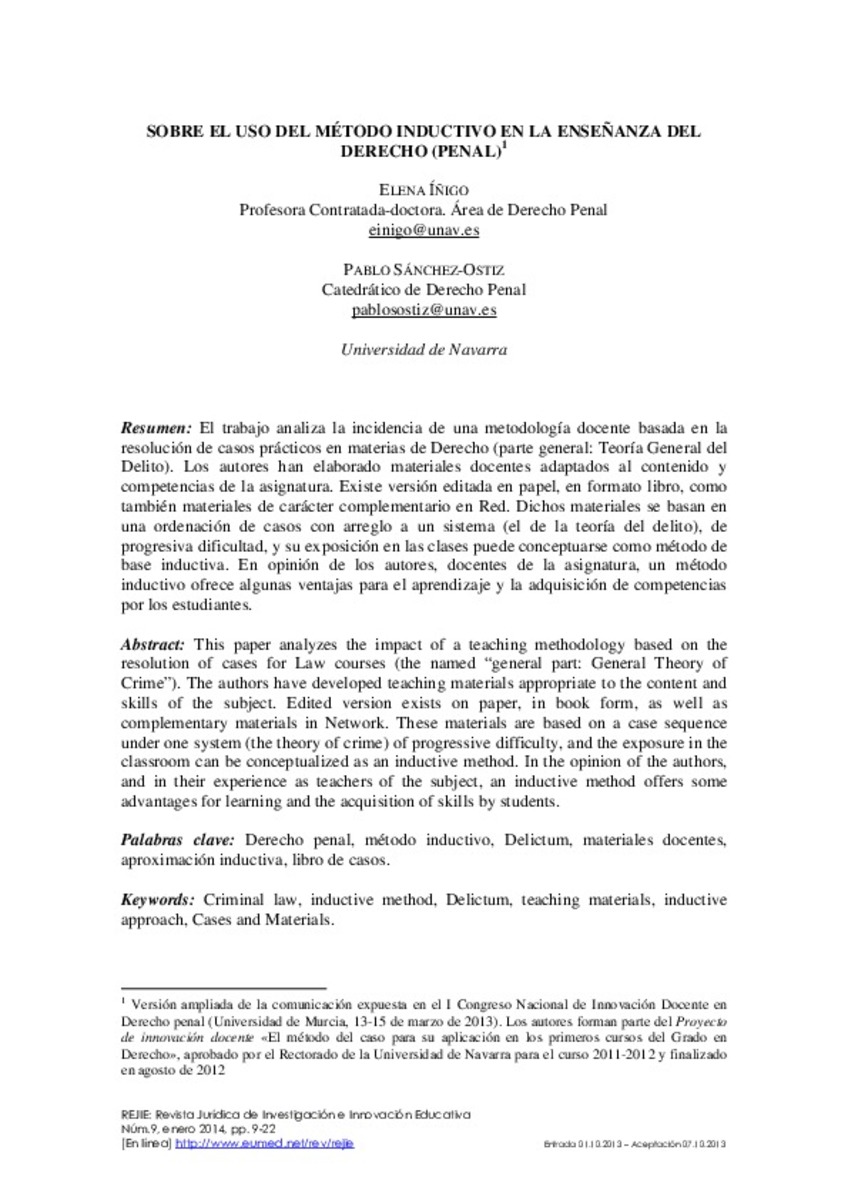Full metadata record
| DC Field | Value | Language |
|---|---|---|
| dc.creator | Iñigo-Corroza, E. (Elena) | - |
| dc.creator | Sánchez-Ostiz, P. (Pablo) | - |
| dc.date.accessioned | 2020-12-21T11:35:22Z | - |
| dc.date.available | 2020-12-21T11:35:22Z | - |
| dc.date.issued | 2014 | - |
| dc.identifier.citation | Iñigo-Corroza, E. (Elena); Sánchez-Ostiz, P. (Pablo). "Sobre el uso del método inductivo en la enseñanza del Derecho Penal". Revista Jurídica de Investigación e Innovación Educativa. (9), 2014, 9 - 22 | es |
| dc.identifier.issn | 1989-8754 | - |
| dc.identifier.uri | https://hdl.handle.net/10171/59907 | - |
| dc.description.abstract | El trabajo analiza la incidencia de una metodología docente basada en la resolución de casos prácticos en materias de Derecho (parte general: Teoría General del Delito). Los autores han elaborado materiales docentes adaptados al contenido y competencias de la asignatura. Existe versión editada en papel, en formato libro, como también materiales de carácter complementario en Red. Dichos materiales se basan en una ordenación de casos con arreglo a un sistema (el de la teoría del delito), de progresiva dificultad, y su exposición en las clases puede conceptuarse como método de base inductiva. En opinión de los autores, docentes de la asignatura, un método inductivo ofrece algunas ventajas para el aprendizaje y la adquisición de competencias por los estudiantes. | es_ES |
| dc.description.abstract | This paper analyzes the impact of a teaching methodology based on theresolution of cases for Law courses (the named “general part: General Theory ofCrime”). The authors have developed teaching materials appropriate to the content andskills of the subject. Edited version exists on paper, in book form, as well ascomplementary materials in Network. These materials are based on a case sequenceunder one system (the theory of crime) of progressive difficulty, and the exposure in theclassroom can be conceptualized as an inductive method. In the opinion of the authors,and in their experience as teachers of the subject, an inductive method offers someadvantages for learning and the acquisition of skills by students. | es_ES |
| dc.language.iso | spa | es_ES |
| dc.publisher | Universidad de Málaga | es_ES |
| dc.rights | info:eu-repo/semantics/openAccess | es_ES |
| dc.subject | Materias Investigacion::Derecho | es_ES |
| dc.subject | Derecho penal | es_ES |
| dc.subject | Método inductivo | es_ES |
| dc.subject | Delictum | es_ES |
| dc.subject | Materiales docentes | es_ES |
| dc.subject | Aproximación inductiva | es_ES |
| dc.subject | Libro de casos | es_ES |
| dc.subject | Criminal law | es_ES |
| dc.subject | Inductive method | es_ES |
| dc.subject | Teaching materials | es_ES |
| dc.subject | Inductive approach | es_ES |
| dc.subject | Cases and materials | es_ES |
| dc.title | Sobre el uso del método inductivo en la enseñanza del Derecho Penal | es_ES |
| dc.type | info:eu-repo/semantics/article | es_ES |
| dadun.citation.endingPage | 22 | es_ES |
| dadun.citation.number | 9 | es_ES |
| dadun.citation.publicationName | Revista Jurídica de Investigación e Innovación Educativa | es_ES |
| dadun.citation.startingPage | 9 | es_ES |
Files in This Item:
Statistics and impact
Items in Dadun are protected by copyright, with all rights reserved, unless otherwise indicated.






